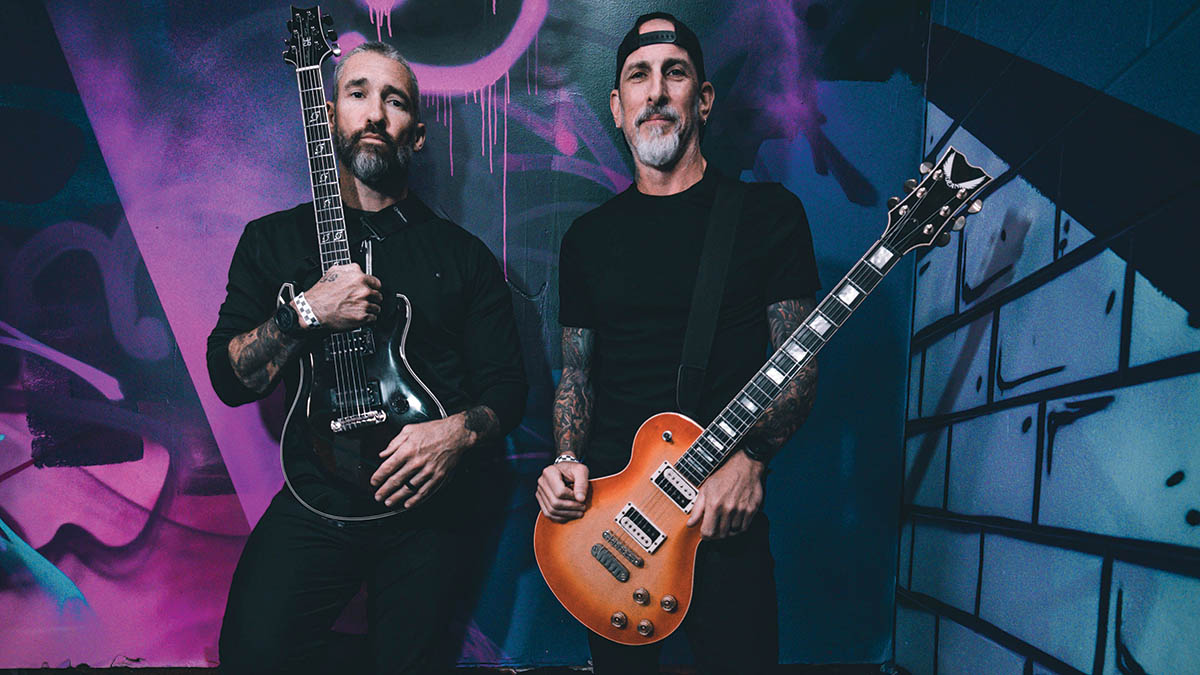“It’s not about how complex your phrases are, it’s just about your style and stamp”: Sevendust’s John Connolly and Clint Lowery on how they “fell back in love with the art of soloing”
Returning with and tuning down for Truth Killer, Sevendust are confronting their demons head on with big riffs, and a newly regained appetite for lead guitar

All the latest guitar news, interviews, lessons, reviews, deals and more, direct to your inbox!
You are now subscribed
Your newsletter sign-up was successful
Sevendust rhythm guitarist John Connolly was loving the sound of the band’s Truth Killer album as they were tracking it in Florida last summer. It’s easy to understand why; the veteran Atlanta hard rockers’ 14th full-length consistently brings the boom through a series of chunked-out, darkly detuned progressions.
But the guitarist also recalls one particular moment – a couple of days after he’d locked in a bombastic, inverted bend motif for the record’s Love and Hate – where things got a little weird. As bassist Vince Hornsby began laying down the low end for producer Michael “Elvis” Baskette, a bewildered Connolly noticed the piece had accidentally devolved into a tonal nightmare.
“I walked in and was like, ‘Why does this sound…off?,’” Connolly tells Guitar World. “They couldn’t get the bend; something about being down that low just wasn’t connecting. So I played the riff on my guitar, and they were like ‘Ohhhhhh!’ The bass was just [tuned] a half-step off, but I was having an aneurysm listening to it.”
“The menacing sound of that bend is such a big Sevendust thing to me,” lead guitarist Clint Lowery says of Love and Hate, though he reveals that the song had been on the chopping block before the group perfected its powerfully percussive edge – and pitch. “It’s got this really simple, Alice in Chains, chromatic, one-fret [descension]. That Jaws kind of energy goes a long way.”
This is all to say that, more than 25 years after releasing their gold-selling self-titled debut, Sevendust’s music still has plenty of bite. You can credit much of that success to the way the group’s original lineup has kept simpatico all these years, outside of Lowery’s four-year sabbatical in the mid-aughts.
Both guitarists note that maintaining their friendship with Hornsby, vocalist Lajon Witherspoon and drummer Morgan Rose is much more important to them than the music, but sick riffs can’t hurt the bond, either. And with Truth Killer, Lowery and Connolly get extra low through the use of various baritones, seven-strings, multi-scales, and more.
“We usually go with the instruments that fight us the least,” Connolly notes of the sessions’ rotating arsenal, adding “When you’re going down that low, you sort of go with the flow.”
All the latest guitar news, interviews, lessons, reviews, deals and more, direct to your inbox!
As with the gear haul, Truth Killer similarly explores a wide range of woofer-rumbling tunings, with Sevendust plunging all the way down to a drop F# for the inkily incandescent Sick Mouth. Lowery says that song’s cavernous groove arose through some collaborative work he was doing with murky alt-metal unit Cane Hill, before ultimately surfacing on Truth Killer.
“I was trying to impress [Cane Hill],” he says. “They play crazy low; I don’t even know the lowest tone, but it was almost comical. I was trying to meet them halfway, as that was as low as I could get on my guitar at home. But right after I sent that to them, they were like, ‘This is a great song for Sevendust!’ I was like, ‘You’re right! Let me just keep this.”
I was trying to impress Cane Hill. They play crazy low; I don’t even know the lowest tone, but it was almost comical
Clint Lowery
Truth Killer follows 2020’s Blood & Stone, a record Sevendust finished just before the start of the pandemic. Like many, Lowery and Connolly wrote their way through lockdowns.
Lowery experimented with electro-organic textures for a pair of solo EPs, while Connolly and Hornsby made another record with their side-hustle, Projected. Through all that, they also accumulated a clutch of especially heavy ideas for Sevendust.
Following pre-production at their respective homes, the songwriters met up with the rest of the group at Witherspoon’s farmhouse in early 2022 to rehearse new tunes. Though they only spent a few days on the singer’s farm – both guitarists reiterate that while the act tracked a few basic ideas onto their laptops, Witherspoon’s spot doesn’t sport a pro studio setup – Rose bashed out preliminary beats on an electronic drum kit – the rural Georgian locale rekindled the quintet’s connection.
Quite quickly, their focused-but-informal jams tapped into the spirit of early Sevendust. “The farmhouse was an opportunity for us to get together in the same room and get that energy, the way that we started our band,” Lowery says, adding of their connection, “There’s something special about when we’re all together.”
The song that really scorched it up in the farmhouse was Truth Killer’s first single, Fence. While the album is full of foundation-cracking bounces, Fence is Sevendust at their most manic, ramping up Truth Killer’s bpms through mutated, metal-plated boogie-woogie riffs.
“There’s that tipping point where we know we’re doing something slightly out of our comfort zone, but the second we drop back in the verse, it’s just classic Sevendust,” the guitarist says with respect to the greasy, rock ’n’ roll swing of the intro.
As Connolly suggests, though, the verse’s furiously syncopated, djent-jolted pace caps locks the band into an unmistakable groove, above which Witherspoon bellows out a proper m.o. for the returning Sevendust: “Time to light the fuse.” When it came to how Lowery accentuated the piece, in particular, that meant feverishly multi-tracking layers of octaver-riddled scale work, skull-boring tremolo ambiance, and explosive tapping.
“That’s the beauty of having two guitar players with different styles,” Lowery says of the supportive flair he brought to Connolly’s rhythmic judding, adding, “I love doing overdubs, even if it’s very small. Like, there are a lot of ’verbed-out delays on most of the choruses we do. It’s just such a fun thing to do… the whole process of putting the color on the songs.”
Beyond his layering prowess, Lowery also rekindled his relationship with a good lead on Truth Killer. His fandom for the '80s-era shred of Jake E. Lee, Steve Vai and Randy Rhoads arguably informed the tastily mapped-out phrasing of his Won’t Stop the Bleeding solo, while a looser, vibe-based approach to vibrato shines through Lowery’s work on Superficial Drug.
He also credits the guitar playing of Nine Inch Nails’ Trent Reznor as an influence in terms of mixing dissonance into his overall style. Regardless of the route, Truth Killer is the first time Sevendust’s lead guitarist has gone this big in a long while.
“Solos have always been an interesting thing with our band. There was a time when solos were out of fashion, in a way, so there are a lot of records we did where there weren’t [any big leads],” Lowery says, explaining that even as recently as Blood & Stone, he mostly shied away from that side of his playing.
“I got to a point a few records back where I went, ‘Really, what’s the purpose of our solos anymore? I’m not going to out-shred anybody.’ I was jaded, but then I fell back in love with the art of soloing.
“It’s not about how complex your phrases are, or what type of dexterity you have, it’s just about the notes you choose, your style and your stamp.”
Though Sevendust riffed out the bulk of Truth Killer’s rhythms with their beefy-toned baritones, Lowery preferred to rip out his leads in standard tuning.
“With that baritone-ish, heavier gauge, you obviously can’t do a guitar solo well, unless you’re Stevie Ray Vaughan,” he says of his nimble-fingered rationale. Lowery was less precious when it came to picking which E-standard-set instrument to wail on. Sometimes he opted for his PRS signature guitar, though he also incorporated a pair of Teles Baskette had hanging around in his studio (“If I can do legato comfortably, then I can do a guitar solo on it”).
While Truth Killer often thrives through Lowery’s excess, the album likewise features some of Sevendust’s most subdued guitar performances to date. Take its opener, I Might Let the Devil Win, for example – an electronics-forward piece where synths, snap beats, and Witherspoon’s soulful croon encroach the liminal space between Nine Inch Nails and Canadian pop figure the Weeknd.
Connolly notes that the song was an exercise in restraint. While he had tracked more than a dozen different guitar ideas, he and Baskette exercised a lot of that flash. Ultimately, they realized the song needed a less-is-more approach. A full three minutes pass before the band break out the distorted guitars.
Sometimes you can spin yourself out by overthinking the mix. The more I listen to it, the worse it generally gets
John Connolly
“I think what fascinated me the most was the vocal hook,” Connolly says of weighing his priorities. “It was almost like, ‘We need to give that so much space that it’s sort of scary.’ When people hear it, they’re going to be like, ‘Where are the guitars? What’s going on here?’ It’s different from what you’re used to with Sevendust.”
Even beyond his fret work, Connolly learned to lean back for Truth Killer. On earlier Sevendust releases – and more recently on Projected’s 2022 full-length, Hypoxia – the guitarist had a tendency to overanalyze his contributions.
An avid jogger – he’d completed the Boston Marathon a few days prior to connecting with Guitar World – he’d throw on his headphones, head off on a run, and make mental notes on the music before retracking a multitude of “eleventh hour” changeovers. While popping into Baskette’s studio on a bass tracking day mercifully righted the pitch of Love and Hate, Connolly generally learned to trust his producer, his bandmates, and himself to get the job done.
“I played it for a few people, for sure, but I didn’t wear it out; I didn’t put it on the running playlist; or blast it like every other record that we’ve done,” he says of his change in process. “Sometimes you can spin yourself out by overthinking the mix. The more I listen to it, the worse it generally gets.”
Despite a mix of sonic and psychological shifts, Truth Killer undoubtedly pays homage to Sevendust’s percussively punchy heritage – while Connolly praises the modern metal heft he dimed out of Neural DSP’s almighty Gojira plug-in, the sessions notably also had the guitarist cranking up the vintage Marshall Super Tremolo head he’d used on their self-titled debut.
Working in impressive extremes, the album also manages to be both blatantly solo-centric and presented with Sevendust’s softest touch. No matter the approach, Lowery suggests that his creative process before bringing music to the band can sometimes be unnerving. That Truth Killer sticks the landing is a testament to its members’ unwavering trust in one another.
“My mental health depends on writing songs,” Lowery says. “So there’s an agonizing element to that where you’ll second-guess things. You think, ‘Oh, I’m old now; I’m not relevant,’ all these insecurities that come with the ups and downs of writing… but you have other guys to lean on when you feel that way.”
“I’ve spent more time with these guys than I’ve spent with any other human being – even my wife,” Connolly says of the closeness he and his friends have honed over 30 years of music making. “Egos have taken a huge backseat to what Sevendust is as a whole. I know they’re my better halves; I’m just a piece of this little puzzle.”
“At the end of the day I just wanted to make myself happy, and I wanted to make my bandmates happy,” Lowery says of the supportive kinship he and Connolly have built up with their Sevendust bandmates. “If the by-product of that is a record everyone thinks is cool, that’s great. It is an agonizing thing when you’re in the middle of it, though.”
- Truth Killer is out now via Napalm.
Gregory Adams is a Vancouver-based arts reporter. From metal legends to emerging pop icons to the best of the basement circuit, he’s interviewed musicians across countless genres for nearly two decades, most recently with Guitar World, Bass Player, Revolver, and more – as well as through his independent newsletter, Gut Feeling. This all still blows his mind. He’s a guitar player, generally bouncing hardcore riffs off his ’52 Tele reissue and a dinged-up SG.

